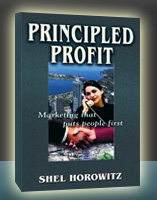What is Morally Responsible Investing?
|
George P. Schwartz, CFA on Morally Responsible Investing for Christians [Editor’s Note: While I am a very strong advocate of socially responsible investing-investing in companies that strongly reflect and do not undermine your values-I want to make it very clear that the particular values espoused by Mr. Schwartz are not at all my own. For example, where he would block investment in companies that advocate something other than a narrow view of family (husband, wife, children), I would block those who are intolerant toward non-traditional families, and a gay-friendly policy would be a reason to consider investing. He opposes stem-cell research; I think it may be our best hope in curing some horrible diseases. In his new book, Good Returns: Making Money by Morally Responsible Investing, author and Chartered Investment Counselor George P. Schwartz, CFA, calls Christians and conservatives to pursue a portfolio that reflects their values. “When you buy stock in a company, you are not just holding a piece of paper. You become part owner of that company, and that role includes some rights and responsibilities,” says Schwartz. “Your financial investment is supporting something, and you need to do the research to ensure that you are not supporting or tacitly agreeing to activities that are morally abhorrent to you.” Schwartz explains the important distinction between the pop culture notion of socially responsible investing and the narrower and more exacting demands of morally responsible investing. While socially responsible investments tend to screen out companies according to left-leaning causes like environmentalism, gay rights, and a broad (and often loosely defined) range of social justice issues, morally responsible investments screen out companies according to a clear set of criteria: those who support or service the abortion industry, producers and distributors of pornography, and companies involved in embryonic stem cell research. Q: What does it really mean to be an investor? A: When you buy stock in a company or equity in a mutual fund, you become part owner of that company. You are not just holding a piece of paper. Your role as part-owner includes some rights and responsibilities. The company you own acts in your name, not only in delivering value as an investment by maintaining and improving its profitability but in what it does on a daily basis. Knowing how the company or fund is spending money is both your right and your responsibility. Your financial contribution is supporting something, and you need to do the research to ensure that you are not supporting or tacitly agreeing to activities that are morally abhorrent to you. Q: In the book, you make a distinction between the increasingly popular “socially responsible investment” funds and “morally responsible investment” funds. What’s the difference? A: “Socially Responsible Investment” funds tend to focus on the issues of the politically liberal lobby-screening out companies believed to be environmentally harmful, defense contractors, producers of alcohol, tobacco, and firearms, etc., and screening in companies that provide low-cost housing, promote gender equity and gay rights, etc. These designations are very broad and loosely defined. “Morally Responsible Investing,” on the other hand, is a very specific approach to religiously based investing-one that is motivated by faith and is guided by a particular set of ethical precepts. It focuses specifically on making investment decisions that embrace key areas of human concern. Just because an investment plan has a religious flavor or touts a church connection, you shouldn’t assume that it is markedly different from the general run of “socially responsible” offerings. For the morally responsible investor, overshadowing every other consideration is the sanctity of life. This means screening out companies that make abortion-related drugs, publicly traded hospitals that perform abortions, companies involved in embryonic stem cell research, and companies that contribute to Planned Parenthood. The next consideration beyond the sanctity of life is the inviolability of marriage. Morally responsible investors screen out companies involved in the production and distribution of pornography. This includes most Hollywood studios and entertainment media and several publishers. A 25 minute pre-recorded interview with George Schwartz featuring Good Returns is now available at www.uReadBooks.com/Schwartz. You can preview the interview in the audio player, then download the program at right to play on your station at your convenience. Check out the other great uReadBooks interview programs available while you’re there. Q: Why do Christians, particularly those who actively practice their faith, have the potential to be successful investors? A: It would be downright silly to claim that only good, moral and religious people can succeed at investing. There are numerous examples of dirty, rotten scoundrels who have made killings in the stock market, so many, in fact, that the idea of ruthlessness as a prerequisite to investment success is a common cliché-the “Gordon Geckko” model, as it were. Yet, I am convinced that there is a certain relationship between conviction in spiritual matters and acumen in analyzing the market. I think that relationship lies primarily in two areas: (1) an ability to see beyond surface features into inner realities; and (2) a willingness to dedicate oneself to disciplined practices over time. The Bible is filled with commercial imagery and financial references that have provided the basis for centuries of reflection on economic and business matters. Some of them comment quite explicitly on the virtue of investing for the sake of future security. Devout Christians have learned the concept of delayed gratification, for example. They are better able to withstand the ups and downs of the market, and they would be less likely to panic and make emotionally-driven decisions in the midst of financial crises like the market meltdown of October 2008. Q: For moral people, there is a certain peace of mind in screening out companies whose practices conflict with their values. But do they suffer financially for that decision? A: In a word, no. You might be surprised to discover that in following the strict guidelines for screening companies, the Catholic Advisory Board of Ave Maria Mutual Funds has only excluded about 150 companies-out of the 3,000 companies in the Russell 3000 Index. And there is nothing that says all of these rejects would have been good investments in the first place. Take the pornography industry, for example. A cursory observation of our sex-saturated culture would lead some investors to believe that the pornography industry is a sure money-maker. That couldn’t be further from the truth. In fact, the industry is crumbling. Who wants to pay for a skin flick or magazine when you can get it for free on the internet? Immoral or not, it’s likely to be a bad investment. |


 Shel specializes in affordable, ethical, and effective marketing for authors, publishers, small businesses, nonprofits, and community groups. Copywriter, marketing and publishing consultant, international speaker, and award-winning author of seven books.
Shel specializes in affordable, ethical, and effective marketing for authors, publishers, small businesses, nonprofits, and community groups. Copywriter, marketing and publishing consultant, international speaker, and award-winning author of seven books.